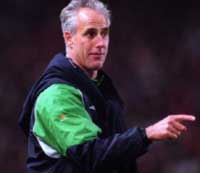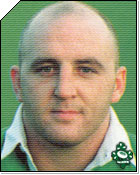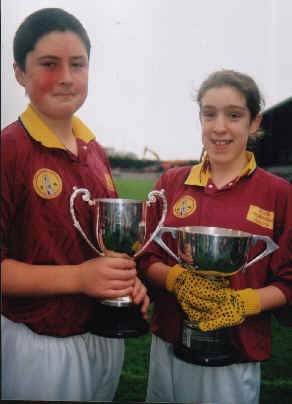The Rock Of Cashel
Sports Of Ireland
The Rock Of Cashel |
|
Sports Of Ireland |
![]()
|
Our National Sports |
Cork Stars |
 The World Cup |
 Other Sports In Ireland |
 Sport In Our School |
![]()
|
Our National Sports |
|
Introduction To Our National Games |
Hurling Hurling is a game similar to hockey, in that it is played with a small ball and a curved wooden stick. It is Europe's oldest field game. When the Celts came to Ireland as the last ice age was receding, they brought with them a unique culture, their own language, music, script and unique pastimes. One of these pastimes was a game now called hurling. It features in Irish folklore to illustrate the deeds of heroic mystical figures and it is chronicled as a distinct Irish pastime for at least 2,000 years. The stick, or "hurley" (called camán in Irish) is curved outwards at the end, to provide the striking surface. The ball or "sliothar" is similar in size to a hockey ball but has raised ridges. Hurling is played on a pitch approximately 137m long and 82m wide. The goalposts are the same shape as on a rugby pitch, with the crossbar lower than a rugby one and slightly higher than a soccer one. You may strike the ball on the ground, or in the air. Unlike hockey, you may pick up the ball with your hurley and carry it for not more than four steps in the hand. After those steps you may bounce the ball on the hurley and back to the hand, but you are forbidden to catch the ball more than twice. To get around this, one of the skills is running with the ball balanced on the hurley To score, you put the ball over the crossbar with the hurley or under the crossbar and into the net by the hurley for a goal, the latter being the equivalent of three points. Each team consists of fifteen players, lining out as follows: 1 goalkeeper, three full-backs, three half-backs, two midfielders, three half-forwards and three full-forwards. |
Gaelic Football Gaelic Football can be described as a mixture of soccer and rugby, although it predates both of those games. It is a field game which has developed as a distinct game similar to the progression of Australian Rules. Indeed it is thought that Australian Rules evolved from Gaelic Football through the many thousands who were either deported or emigrated to Australia from the middle of the twentieth century. Gaelic Football is played on a pitch approximately 137m long and 82m wide. The goalposts are the same shape as on a rugby pitch, with the crossbar lower than a rugby one and slightly higher than a soccer one. The ball used in Gaelic Football is round, slightly smaller than a soccer ball. It can be carried in the hand for a distance of four steps and can be kicked or "hand-passed", a striking motion with the hand or fist. After every four steps the ball must be either bounced or "solo-ed", an action of dropping the ball onto the foot and kicking it back into the hand. You may not bounce the ball twice in a row. To score, you put the ball over the crossbar by foot or hand / fist for one point or under the crossbar and into the net by foot or the hand / fist in certain circumstances for a goal, the latter being the equivalent of three points. Each team consists of fifteen players, lining out as follows: One goalkeeper, three full-backs, three half-backs, two midfielders, three half-forwards and three full-forwards.
|
Camogie Camogie is a spectacular field game, based aroung the same ideas of Hurling. It is played by young girls and women. Cumann Camógaíochta na nGael was founded in 1904 with the aim of providing Gaelic games for the girls and women of Ireland. Camogie quickly became popular throughout the country and also spread to other countries. The Camogie Association (Cumann Camó gaíochta na nGael) is now one of the largest sports organisation in Ireland for women and girls, and its membership includes many male colleagues who participate in such areas as administration, coaching and refereeing. Camogie is the native field game akin to hurling and is renowned for skill and speed, for personal enjoyment by the player and for appeal to the spectator.
|
Handball Handball involves two or four players (singles or doubles), a ball, durable hands and a few walls. Although there are variations in the size of court (60 feet x 30 feet and 40 feet x 20 feet) and in the nature of the ball used, the basic object of the game is to defeat your opponent in a contest requiring speed, agility, guile and skill. Handball is like squash without the rackets, with the players striking the tiny ball against the front wall (later using the other walls), in the hope that they will place it where it eludes their opponent and thus deliver another point to the player who has "served". Over the centuries the game was played in outdoor ball alleys (in the early days it was often played with just a single wall) but it has now become more sophisticated and moved indoors. Competition for both sexes and all age groups now take place in plush, enclosed handball courts, making the game faster than ever and certainly more exciting and entertaining. Uniquely among Irish Gaelic Games, handball has a thriving international dimension, being played in the United States, Canada, Australia, Mexico, Spain and other parts of Europe. World and European championships are now staged. |
![]()
Cork Stars |
|
|
|||||||||||||||||||||||||||||||||||||||||||||||||||||||||||||||
|
|
| DATE OF BIRTH: 20th November 1969 AGE: 32 PLACE OF BIRTH: Cobh,Co. Cork RESIDENCE: Perth Australia HEIGHT: 175cm WEIGHT: 118 pounds OCCUPATION: Athlete+Mother of 2 children European 5,000 and 10,000m winner 1998 World Cup 5,000m winner 1990 Winner 5,000m World Championships 1995 World Record holder 2,000m 1994 Sonia is the Irish record holder at every distance between 800m and 10,000m BY B.Brosnan and D.Hyde |
|
![]()
The World Cup |
Ireland re-emerging from the shadowsThe Republic of Ireland emerged in 1987 under the tutelage of former England great Jack Charlton, who took the team to two FIFA World Cups™ and a UEFA European Championship in the space of six years. Since Big Jack's retirement in 1995, his former protégé Mick McCarthy initially struggled to return the nation to former glories before qualifying for the 2002 FIFA World Cup Korea/Japan, where the Irish emerged from the "group of death" that included The Netherlands and Portugal. Captain and playmaker Roy Keane has finally reached the level of impact at international football that he has had for his club Manchester United over the past few years. The gritty midfielder has a talismanic power over the Irish team, lifting the entire side to levels they would almost never reach on their own. Keane's supporting cast are mostly young and exciting prospects. Blackburn Rovers winger Damien Duff, Ipswich's Matt Holland, Charlton's Mark Kinsella and Wolves flanker Mark Kennedy all give the Republic an unprecedented level of skill and flexibility in midfield.
Leeds striker Robbie Keane (no relation to Roy) is one of Europe's most potent threats up front, while free-scoring Crystal Palace forward Clinton Morrison appears to have a bright future in the green shirt. Wimbledon and former Wimbledon striker David Connolly is also an excellent impact player that any side would love to have on the bench. BY C.Sheehy and D.D.Roche |
For more Information on the Irish Team, click HERE |
Irelands Fixtures for the World Cup
Ireland V Cameroon 1-1 M.Holland JUNE 1 Niigata Stadium Big Swan in Niigata will host Ireland's opening World Cup match against Cameroon.
Ireland V Germany 1-1 R.Keane JUNE 5 Kashima Soccer Stadium in Ibaraki will play host to Ireland's crucial match with Germany.
Ireland V Saudi Arabia 3-0 R.Keane,G.Breen,D.Duff JUNE 11 TThe 70,000 capacity International Stadium in Yokahama will host Ireland's final group match against Saudi Arabia. The stadium, the biggest in use at this World Cup, and will also host the final.
BY J.Keane, S.Keane and S.Scanlon For more information click HERE |
![]()
|
Other Sports In Ireland |
|
![]()
Here is a list of links to other sporting bodies in Ireland
![]()
![]()
| Rugby | Basketball | Showjumping |
| Hockey | Athletics | Soccer |
![]()
![]()
|
Sport In Our School |
|
![]()
| We really enjoy sport in
Whitechurch N.S. We are really lucky, because we have a GAA pitch right behind the school.
Our Boys and Girls Football teams won their divisions in the Sciath na Scol finals,
held in Pairc Uí Rinn last November(2001). Our class went to see the matches and
one of our classmates S.Dilworth played in the girls match. Also, three girls from sixth class played in both the boys and girls finals. Our teacher takes us to the hall where we practice indoor football, hurling, basketball and handball. Last years 3rd class got to the county final in Indoor Hurling. We lost in the semi-finals this year. Our school was also very successful in the Cork City Sports last year. Our school won the cup for the 'Best School' of the day. By L.Eivers, K.Grace and M.Foley |
|
![]()
The Rock Of Cashel
|
Ruins are all that remain of this hilltop stronghold steeped in history. St. Patrick, Ireland's patron saint, baptised King Aengus here in the fifth century. After serving as the seat of the kings of Munster, the site was given to the Church and the first cathedral was erected on the Rock of Cashel in the 12th century. The Rock of Cashel is a very prominent feature in the town of Cashel, County Tipperary. It sits high on a hill overlooking the town like a miniature Camelot. Its most prominent features are the round tower and the broad curtain wall that surrounds the whole site. |
You round a 20th century bend on the main Dublin-Cork road and you are transported back 1,500 years.
There, standing proud of the plains, is the great 4th century fortification of Cashel - the stone fort. This was the seat of kings and mediaeval bishops for 900 years and flourished until the early 17th century. Indeed there was a settlement here from pre-Christian times, traces of which have long since vanished.
The original forbidding fortification of the Eoghanachta, kings of Munster, witnessed the struggle for dominance of Munster kings over the whole of Ireland. Brian Ború was crowned King of Munster here in 977 and he became High King of Ireland in 1002. He was the first high king to exact universal and effective tribute from the other kings of Ireland
The great monument in stone has seen war and peace, scholarship and devotion over a millennium and a half. It is fitting, therefore, that once again, the great traditions of learning and art which kept the flame of scholarship alight in a Europe dimmed by the Dark Ages, should have an echo at Cashel today.
Brú Ború - The palace of Ború - is a national heritage centre at the foot of the Rock of Cashel. This cultural and interpretative village is designed around a village green and is home to the study and celebration of native Irish music, song, dance, story telling, theatre and Celtic studies.
![]()
|
For more information, click HERE |
|